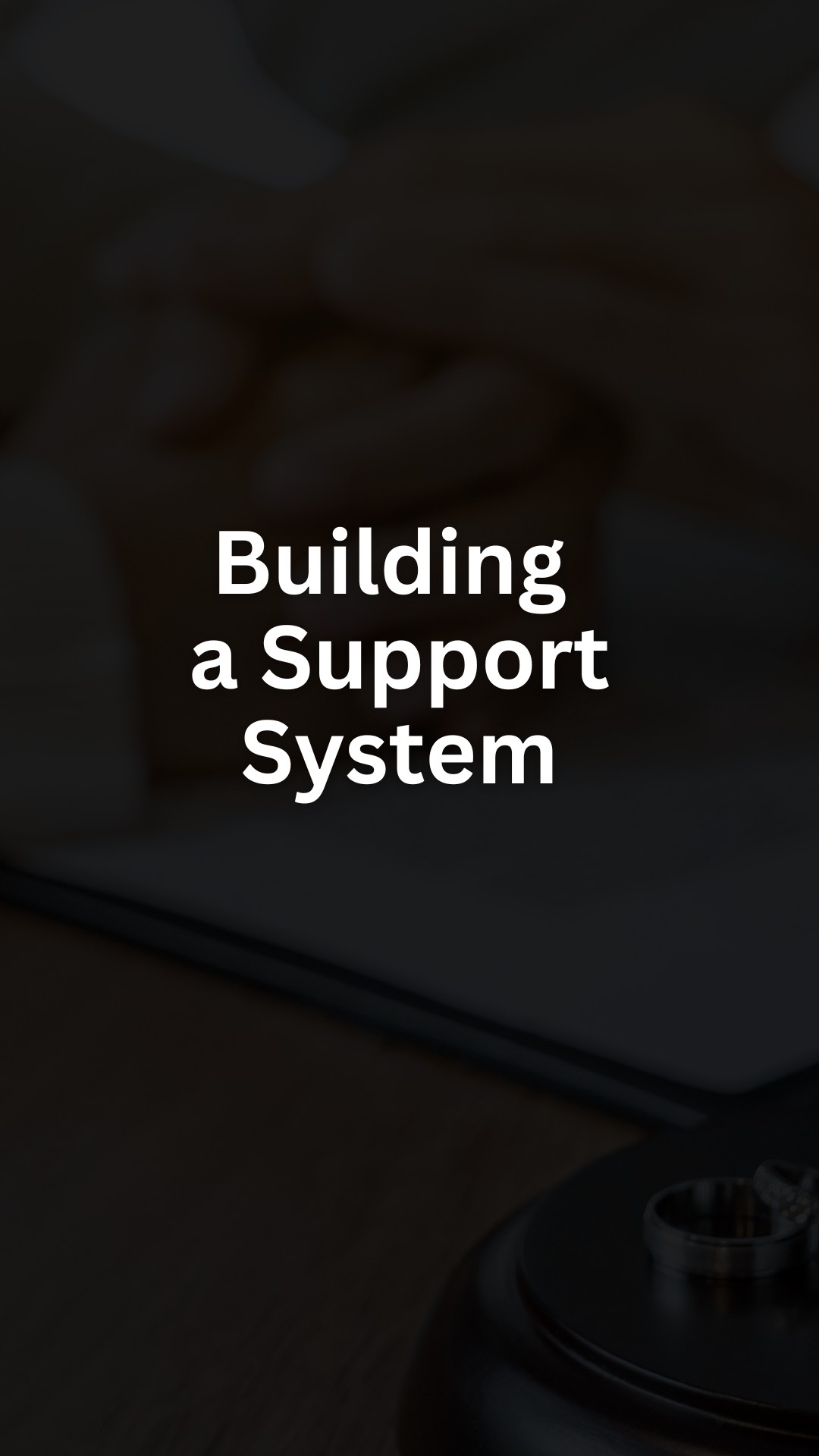Divorce can be one of the most challenging experiences in life, but there are ways to stay calm and focused during this tough time.
Prioritizing your mental health is crucial.
Make time each day to relax, whether it’s through meditation, reading, or taking a walk in nature.
Good communication can make a big difference.
Try to keep conversations with your ex-partner polite and to the point, focusing on important issues.
Avoid arguments and take breaks if things get heated.
Surround yourself with support.
Friends and family can offer a listening ear and help you feel less alone.
Don’t hesitate to seek professional help if needed; therapists and counselors can provide the tools to manage stress and emotions effectively.
Understanding the Legal Process

Going through a divorce can be stressful. Knowing how to navigate the legal process can help ease some of the burdens.
Hiring Competent Legal Representation
Finding the right lawyer is crucial. You need someone experienced in handling divorces.
This lawyer should understand the laws in your area and be able to guide you through each step.
Meet with a few lawyers before making your choice.
Ask about their experience, fees, and approach to handling divorces.
It’s essential to feel comfortable with your lawyer.
A good lawyer can make the process smoother and help you make informed decisions.
Knowing Your Rights and Obligations
Understanding your rights and obligations is vital. You need to know what you’re entitled to and what you must do.
This includes property division, child custody, and financial support.
Learn about the laws in your state. These laws vary and will affect how your divorce proceeds.
Your lawyer can explain what you need to know.
Being informed helps you protect your interests and ensures that you’re prepared for the legal process.
Communicating Effectively

Handling communication well during a divorce can reduce conflicts and stress.
Focus on setting clear boundaries and consider using a mediator to keep conversations calm and productive.
Setting Boundaries with Your Ex-Partner
Start by defining what you are comfortable discussing and what you prefer to avoid.
Write down these boundaries and share them with your ex-partner.
It’s important to be clear and firm without being confrontational.
Use specific times and methods for communication, like phone calls only on weekdays or emails only for important matters.
This can help prevent misunderstandings and keep interactions respectful.
If conversations become heated, take a break and revisit the topic later.
Remember, the goal is to minimize conflict and protect your mental health.
Using Mediators for Communication
Sometimes direct communication can be too stressful or unproductive.
A mediator can help in these cases by acting as a neutral third party.
Mediators ensure both sides are heard and can suggest compromises.
Mediators can be lawyers, counselors, or professional mediation services.
Choose one that specializes in divorce cases.
They can guide discussions, keep emotions in check, and facilitate fair agreements.
Using a mediator can ease tensions and lead to better agreements.
They can help with everything from dividing assets to arranging custody schedules, making the divorce process smoother for both parties.
Managing Emotions

Dealing with emotions during a divorce can be tough. It’s important to take care of your own well-being and get help when you need it.
Practicing Self-Care
Taking care of yourself means doing things that make you feel good and help you relax.
Exercise can be a great way to relieve stress.
Activities like jogging, yoga, or even walking can help clear your mind and boost your mood.
Eating healthy foods and getting enough sleep are also very important.
When you eat well and are well-rested, you can handle stress better.
Try to avoid too much caffeine or sugar, which can make you feel more anxious.
Journaling can help you process your thoughts and feelings.
Writing things down can make problems seem less scary and more manageable.
Mindfulness techniques like meditation or deep-breathing exercises can make you feel calmer.
Even just taking a few minutes each day to focus on your breathing can make a big difference.
Seeking Professional Support
Talking to a professional can provide you with the tools you need to cope.
Therapists and counselors are trained to help you deal with intense emotions.
They can offer new strategies for managing stress and anger.
Sometimes it might be easier to talk to someone who isn’t a friend or family member.
A therapist can offer a neutral perspective and help you understand your feelings better.
Support groups can also be very helpful.
Being around others who are going through similar experiences can make you feel less alone.
You can share tips and learn from each other’s experiences.
Joining a support group gives you a sense of community and understanding.
Remember, there’s no shame in asking for help. Seeking support is a sign of strength, not weakness.
Protecting Finances

Protecting your finances during a divorce is crucial. You need to create a financial plan and understand how assets will be divided.
Creating a Financial Plan
A financial plan helps you see what resources you have and what you need.
Start by listing all your assets, including bank accounts, investments, retirement funds, and properties.
Don’t forget about debts like mortgages, credit cards, and loans. Knowing the total picture can help you make smart decisions.
Next, set a budget. Track your income and expenses to understand your current financial situation.
This includes daily living costs, children’s expenses, and any ongoing payments. Make cuts where possible to save money.
Consult a financial advisor.
They can provide valuable advice tailored to your situation.
They will help you with investments, retirement planning, and tax implications.
Make sure to keep all financial documents organized and accessible for easy reference.
Understanding Asset Division
Understanding how assets will be divided is key. Divorce laws vary by state, but typically assets are divided equitably, not necessarily equally.
This means that the division should be fair, considering factors like the length of the marriage and contributions by each spouse.
List all marital assets and separate assets. Marital assets are usually acquired during the marriage. Separate assets are things owned before the marriage or received as a gift or inheritance.
Prepare for negotiations with your spouse or their attorney.
If you can agree on asset division, it might save you time and legal fees.
If not, the court will decide based on state laws and fairness. It’s smart to have legal representation to ensure your interests are protected.
Navigating Custody Arrangements

Custody arrangements can be challenging. Prioritizing your children’s needs and developing effective co-parenting strategies is key.
Focusing on Children’s Well-Being
Your children’s well-being should always come first.
Make sure they feel loved and secure. Talk to them often and listen to their concerns.
Keep their routines as consistent as possible. This includes school, extracurricular activities, and time with friends. Stability is very important during this time.
It’s helpful to work with a child psychologist. They can provide support and help your children process their feelings.
Also, avoid speaking negatively about the other parent. This can cause confusion and emotional stress.
Your goal is to keep the home environment calm and supportive.
Co-Parenting Strategies
Co-parenting requires clear communication.
Set up a regular schedule for discussing your children’s needs and schedules.
Use tools like shared calendars or co-parenting apps to stay organized. Always keep your conversations focused on your children.
Be flexible with each other. Sometimes plans will need to change due to unexpected events. Be willing to adjust and compromise. This helps reduce conflict and shows your children that both parents are committed to their well-being.
Finally, set aside any personal conflicts. Focus on what’s best for your children.
They benefit most when both parents work together respectfully and cooperatively.
Building a Support System

Having a strong support system is essential during a contentious divorce. Connecting with family, friends, and joining support groups can help you manage stress and emotions.
Leveraging Family and Friends
Your family and friends can provide emotional support. Spend time with people who listen and care. Share your feelings and thoughts openly. Don’t bottle up emotions.
Ask for help with daily tasks. They might assist with childcare or household chores. Having someone who understands your situation can be comforting.
Plan social activities. Go for walks, have coffee, or enjoy a movie night. These moments can reduce stress and bring happiness.
Joining Support Groups
Support groups can connect you with others who understand what you are going through. Seek out both online and in-person groups.
In these groups, people share their experiences. You can learn coping strategies and find emotional support. It feels good to know you’re not alone.
Consider therapy groups led by professionals. They provide expert advice and structured support. Regular meetings can offer a sense of routine and stability.
Staying Productive

When going through a contentious divorce, staying productive can provide a much-needed sense of normalcy and control. Focusing on your work and hobbies can help you manage stress and keep your mind occupied.
Maintaining Professional Responsibilities
Staying on top of your job duties is crucial.
Begin by setting clear priorities. List out your tasks and break them into manageable parts.
Use a planner or digital calendar to keep track of deadlines. This will help avoid feeling overwhelmed.
Communicate with your employer if needed. Let them know you are going through a personal issue without sharing too many details. This can help them understand if you need some flexibility.
Taking short breaks during the day can also boost productivity.
Step away from your desk to stretch or take a walk. This can clear your mind and improve focus when you return to work.
Seek support from colleagues when necessary.
Don’t be afraid to ask for help with a project or task if required.
Pursuing Personal Interests
Engaging in personal interests can lift your spirits. Think about activities that bring you joy, like reading, painting, or exercising.
Create a routine that includes time for your hobbies. Consistency can help in stabilizing your emotions and providing a sense of purpose beyond work and home responsibilities.
Join a club or group that shares your interests.
This is a great way to socialize and form new connections, which can be especially beneficial during a tough period.
Lastly, set small, achievable goals. Even the simple act of completing a book or finishing a puzzle can provide a sense of accomplishment. This can remind you that you are capable and in control.
Documenting and Organizing Records

Keeping well-documented and organized records is crucial during a contentious divorce. Accurate documentation and good organization can help in legal matters and reduce stress.
Keeping Accurate Documentation
Make sure you keep detailed records of all interactions and transactions. Include:
- Emails and text messages: Save important communications with your spouse.
- Financial records: Keep track of bank statements, pay stubs, and bills.
- Legal documents: File copies of court orders, agreements, and filings.
Use a journal to note significant events, conversations, or any incidents. This can be useful if you need to prove something later.
Organizing these items in a digital format can save space and make searching easier. Use apps or software to help you categorize and store everything safely.
Staying Organized
Creating a system to organize your records can make a huge difference. You can use:
- Binders and folders: Label them clearly and sort by type or date.
- Digital tools: Apps like Evernote or Google Drive can keep everything in one place.
- Calendars: Mark important dates like court hearings, meetings, and deadlines.
Keep a checklist of documents and tasks to ensure nothing is missed. Regularly update your system and remove any unnecessary items to keep it manageable.
Reframing the Experience

Learning from the Process
Divorces are tough, but each challenge is a learning opportunity.
Reflect on what went wrong in your marriage and think about what you can do differently in future relationships. This can help you grow as a person.
Identify your strengths.
What did you do well during the marriage? Knowing your strengths can boost your confidence and help you handle future situations better.
Focus on personal growth.
Take up new hobbies or activities that interest you.
Use the time to develop new skills or improve existing ones. This keeps your mind engaged and can be very rewarding.
Embracing Change
Change is inevitable with a divorce. Accepting this can make the transition easier.
Look at the changes as a fresh start rather than an end.
Create new routines.
Establishing new daily habits can give you a sense of control and stability. Make a list of things you enjoy and incorporate them into your life.
Surround yourself with support.
Reach out to friends and family who care about you.
Being around positive people can lift your spirits and help you adjust to your new circumstances.
Welcome new opportunities.
This might be a good time to explore different careers, move to a new place, or make other big changes you’ve been considering. Embracing these possibilities can lead to a fulfilling new chapter in your life.
Planning for the Future

Staying sane during a contentious divorce often means looking ahead.
This involves setting new goals and embracing new beginnings. Both can help you navigate through this challenging time.
Setting New Goals
Start by reflecting on what you want to achieve.
Making a list can help organize your thoughts.
Think about personal development or career advancements you might have put on hold. Explore new hobbies or interests that excite you. Small steps add up, so focus on actionable goals.
Set realistic, measurable objectives.
Using the SMART method (Specific, Measurable, Achievable, Relevant, Time-bound) can guide you. This can provide a sense of direction and accomplishment, boosting your confidence.
Embracing New Beginnings
View this time as an opportunity for growth.
Your life is changing, and with change comes new prospects.
Begin by acknowledging your feelings.
It’s okay to grieve what you’ve lost, but also look forward to what’s to come.
Find strength in your support network.
Surround yourself with friends, family, and professionals who can offer guidance.
Reconnect with old friends or make new ones. This can provide the emotional stability you need during this time.
Invest in self-care.
Exercise, eat well, and rest.
Prioritize activities that make you feel good about yourself. Rediscover old passions or try something completely new. These new beginnings can lead to a richer, more fulfilling life.
Frequently Asked Questions

Going through a contentious divorce can be emotionally draining. It’s important to find ways to cope with stress, manage grief and anger, support your mental health, and understand the timeline for emotional healing.
How can I cope with the emotional stress of a contentious divorce?
It’s crucial to talk to friends, family, or a therapist about your feelings.
Exercise can help reduce stress as well. Make sure to get enough sleep and maintain a balanced diet.
What strategies can help one manage feelings of grief or anger during the divorce process?
Try practicing mindfulness and relaxation techniques like deep breathing.
Journaling can also be a helpful outlet for processing emotions. Joining a support group can provide both comfort and practical advice.
Is it common to experience emotional turmoil after a divorce, and what can be done to alleviate it?
Yes, it’s normal. Many people find relief through therapy or counseling.
Setting new personal goals and focusing on self-care can also help in moving forward.
What are some effective ways to handle unwanted divorce and its psychological impacts?
Accepting the situation is the first step.
Talking to a counselor can provide perspective and coping strategies. Avoid isolating yourself; stay connected with loved ones for support.
What can I do to support my mental health while going through a tough divorce?
Maintain a routine to create a sense of normalcy.
Engage in activities you enjoy. Seek professional help if the emotional burden becomes too heavy to bear alone.
How long does the emotional healing process typically take after a divorce?
Healing varies for everyone. It might take months or even years.
Be patient with yourself and seek help if needed.
Everyone’s journey is different, but with time, it gets easier.